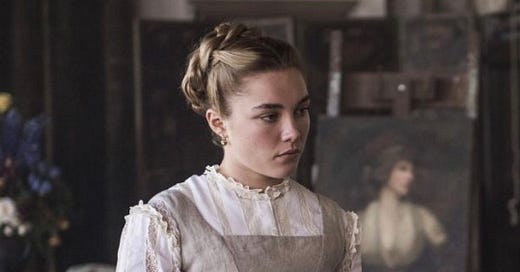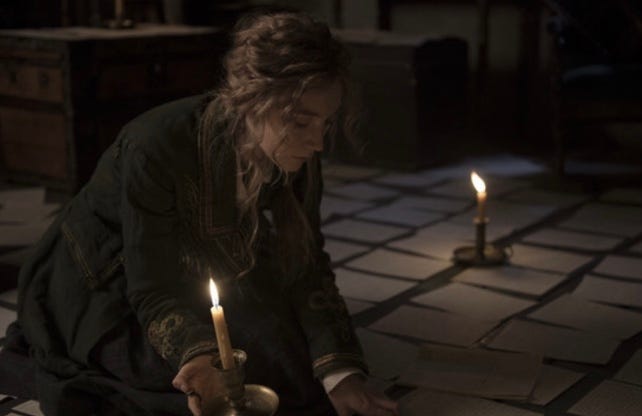When it comes to Little Women, I have zero objectivity. The film is in my all-time top ten, sandwiched somewhere between Fight Club, Magnolia, and The Matrix. That the film is a sumptuous work of gossamer genius is not up for debate, nor that Greta Gerwig is one of the most brilliant writer/directors around. These are hills I am more than willing to die on, and if necessary, bring several people with me.
I first heard about the film at a celebratory dinner at a boutique members club in West Hollywood. I had just sold my first television series to a major studio and attached a lead fresh off her first Golden Globe nomination. With Oscar-winners seemingly at every table, it is fair to say that I was comfortably the poorest, least successful person present. But there was a lot of buzz regarding my script, so I was happy to be the toast of the town for two to three minutes. But as the appetisers arrived, so did attendees of a pre-release screening of Little Women. I say ‘arrived,’ they basically floated inside. Yet what I remember most were their faces, as if they might cry tears of joy, if only they were not so celestially charmed. Naturally, I thought what you are probably about to think… all this for Little Women?
Having read the book and half-heartedly watched the 1994 film as a child, it would be disingenuous to say I gave either a second thought. So much so, that it still took me several years after said floating to watch Gerwig’s version. When I finally did, I realised it was nothing less than bottled joy; deeply romantic yet grounded in a nuance that seemed to bob along seamlessly like the gentle carousel stitching of a nineteenth century hem. James Baldwin once wrote, “The role of the artist is the same as the role of the lover… to make you conscious of the things you don’t see.” How ahead of her time Louisa May Alcott’s ideas were, and the sheer magnitude of her intellect were embarrassingly lost on me. But as an adult, Gerwig’s artistry and comprehension of the book allowed me to fully understand its genius.
Also, having personally been hired to write a modern-day, American retelling of Treasure Island, I can assure you that adaptations of classic books are tricky beasts, yet my task was comparatively easy. Gerwig raised the bar for the ‘faithful’ adaptation, somehow making every morsel of the movie relevant and compelling, without the crutches of a modern setting, fresh location, or the reimagining of characters (in hell, there is probably a teen update where Jo is a content creator trying to go viral). It was staggering how the film seemed to capture the zeitgeist without being boxed in by its period setting. In fact, dialogue that felt incredibly modern, feminist, and an almost surgical evisceration of the hypocrisy with which women face today, was lifted verbatim from the book and Alcott’s own diaries.
Beyond my fanboying, there is a relevance to our cause here. Through the characters of Jo and Amy March, Little Women is a subtle treatise on the notion of being an artist. In fact, the difference between Jo and Amy felt very much the difference between my romanticised idea of being a writer in my twenties, and the reality of being a writer in my thirties.
Despite Amy’s talents and training in Paris as a painter, it is Jo who is considered the true artist, and a revealing line from Amy herself not only explains why, but epitomises a common misconception.
“Talent isn’t genius, and no amount of energy can make it so. I want to be great or nothing.”
Great or nothing. Amy says this at 20, which seems incredibly young to give up on one’s dreams, but less so when she explains the reality of being a female artist in civil war era Massachusetts; believing that she will never make enough money with her, “Middling talent,” to support a family, and so her only realistic choice is to accept the, “Economic proposition,” of marriage. It recalls Virginia Woolf in A Room of One’s Own, who wrote, “A woman must have money and a room of her own if she is to write fiction.” Everything Amy says in this incredible scene is correct for the period, but in terms of this conversation, we are focusing exclusively on the notion that as an artist, you must be great or nothing… which is bullshit.
The ‘Great or nothing’ belief is a fallacy because it applies a finite logic to an infinite pursuit. The work of an artist is continuous. The objective is not to take a single swing – and have its outcome determine whether you are a genius or failure - the objective is to keep swinging, period. Your goal is not to scale one mountain peak and call it a day, your goal is to be in the business of scaling mountains.
After a few years of study, Amy believes she will never be a genius and so refuses to try any further. Yet despite this belief about herself, she does not extend this reductionist philosophy to Jo (an example of how much harder we are on ourselves than others). In her eyes, Jo is an artist because she is writing in New York. Yet we know that Jo has been scraping by writing short stories she hates in the hopes of courting commercial appeal. In Jo’s eyes, she herself is a failure, because she is writing what she knows to be trash just to survive. But still… she persists. Rejection, criticism, and even poverty do not deter her. Nor does she let a lack of encouragement derail her. It takes her years to find her authentic voice, and when she does, she finally achieves the success and financial freedom that her talent deserves.
The reason that Jo is the true artist and ultimately succeeds is that she keeps trying until she is great. In this regard, Jo is braver than Amy, because she has the courage to be bad, and dares to fail as often as it takes. Your choice is not to be great or nothing. Your choice is to be nothing until you are great. So, give yourself permission to take the big swing… and then keep swinging. That is what makes an artist. The world will try to make you an Amy. Instead, be a Jo.
Cheers,
Kris






"The world will try to make you an Amy. Instead, be a Jo."
So perfectly put.